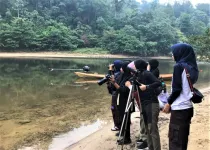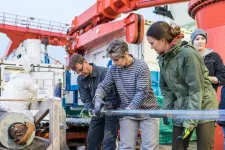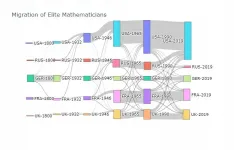(Press-News.org) In a new study published in Conservation Science and Practice, researchers at the University of Maryland (UMD) partnered with Indonesian experts to explore the motivations and challenges of women pursuing a career in conservation sciences in Indonesia. Given that Indonesia is one of the most biodiverse countries on the planet but is simultaneously experiencing extreme rates of deforestation, it is an important target country for the conservation of global biodiversity. Conservation work remains male-dominated in Indonesia, especially fieldwork, so gaining a better understanding of the cultural norms and barriers in place for Indonesian women aspiring to a career in conservation represents an important step in supporting women in this field. With more diverse faces and voices representing global conservation, the country and others like it can tap into the full potential of their intellectual and creative resources to help solve grave global challenges like dwindling biodiversity.
"We are facing huge challenges in the conservation of biodiversity globally," says Erin Poor, postdoctoral researcher in Environmental Science and Technology (ENST) at UMD and leader of this work. "Climate change, habitat loss and encroachment, an increasing human population putting stress on natural landscapes, increased agriculture - these are all large, complex, multidisciplinary challenges. The more intelligent minds we have working to identify creative solutions that benefit humans and wildlife, the better. This means enabling and creating space for women and other underrepresented groups to voice their ideas for conservation solutions."
In order to explore this idea while also practically supporting Indonesian women in conservation, Poor developed and facilitated a workshop in Riau Province, central Sumatra, Indonesia due to its importance in global conservation. Working closely with Indonesian leaders at the World Wildlife Fund-Indonesia (WWF) and the Universitas Gadjah Mada, Poor and the UMD team identified a need for culturally appropriate training and mentorship for women wanting to conduct conservation fieldwork. The workshop was held from September 13-15, 2019, with the goal of providing participants with networking opportunities and offering a setting in which more experienced women in conservation could mentor less experienced women and train them on practical fieldwork skills. As a pilot workshop, 11 Indonesian early-career women attended the workshop, with 3 established Indonesian women providing mentorship and instruction.
"The young women in our workshop were excited and passionate about conservation," says Poor. "We seemed to pick up on the lack of technical training for these women (which may also be an issue among men), and the lack of encouragement and support evidenced by discouragement from family members, a lack of female mentors and networks, and societal perceptions about female roles. Women are excited and passionate about conservation work, they just need to be given the support and tools to be effective."
Documenting the motivations and challenges of these women and their unique experiences represents an important step in making sure women in conservation have the support they need, explains Jennifer Mullinax, assistant professor with ENST and co-author.
"It was telling to see the limited information that existed on the paths, support, and limitations of women in STEM in Indonesia. This is one of the first bricks in the wall of knowledge we need to build a more inclusive and diverse conservation discipline in the global south."
Mullinax provided support for the trip to Indonesia, which was in many ways a continuation of work that Poor had started while pursuing her PhD. "I believe strongly in uplifting and supporting women, especially women in STEM," stresses Mullinax. "As Erin was describing her experiences in Sumatra and her intentions of having the training workshop, I suggested this may be an opportunity to survey the participants and start documenting the needs and barriers of women pursuing STEM in Indonesia. Everyone was on board and considered it a great opportunity as well as potential justification for doing more, larger training and surveys in the future."
To assist with the survey development and analysis, Poor and Mullinax reached out to Jen Shaffer, assistant professor in Anthropology with the College of Behavioral and Social Sciences (BSOS). Shaffer identified a key motivator for the women in this study as a love of nature and a passion for the environment, while challenges were mainly related to gender and cultural norms.
"Although I was unable to participate in the workshop, I really appreciated the opportunity to document the motivations and challenges that established and early career Indonesian women working in conservation science expressed," says Shaffer. "Some of their challenges are unique, and others are experienced by women scientists regardless of where they live and work. Reading their motivation responses to work in conservation was also very uplifting. I saw lots of parallels with discussions I've had with students and colleagues working in conservation science, and it shows our common feelings of passion for, excitement about, and care for nature. We are all working towards a common goal."
"The women in our study expressed some of the same sentiments that I experienced," adds Poor. "First, conservation advertisements often advertise for men - expressing inherent doubt in the physical capabilities of women to do field work. Secondly, Indonesia is extremely diverse in religious, ethnic, and social beliefs, but a belief persists in some geographic regions and in some parts of society that women should be in less physical jobs or be family and household caretakers. Another factor impacting women in the field is that some people also still believe that unmarried men and women should not be alone together."
Poor experienced some of these issues firsthand during her time in Indonesia as a doctoral student. "For me, this was extremely personal," says Poor. "I spent two years in Indonesia doing field work for my PhD research. Almost all of my female friends and I faced sexual harassment and discrimination repeatedly. The field teams I worked with were all male (who were all excellent professionals), and I tried to recruit women to join my team but I only found one woman who actually was able and willing to come to the field. She ended up being hired by WWF as a field team leader (only the second woman in central Sumatra) after my research, and I count that as one of the biggest successes of my research. After experiencing persistent doubt about my abilities as a woman in Indonesia, working to get more women in the field became a personal passion of mine."
Despite these challenges, Poor and the team are hopeful for the future of women in conservation and have plans to expand this work. Poor has been elected as the Vice President of Membership for the Society for Conservation Biology, and she hopes to reach out to young women to increase their involvement in the field. She and the team also hope to continue their research and training efforts on a broader scale.
"I hope this spurs others to take a look at recruitment and retention of women scientists in other areas as well," adds Poor. "By identifying the challenges and motivations women are facing, especially in understudied biodiverse areas in the global south, we can work to remove these challenges and encourage motivations. However, this must be done at the request and with the coordination of scientists in those locations. I am hoping that in Indonesia specifically, those involved with this study will begin thinking about and implementing similar workshops and events specifically geared towards young women conservation biologists."
INFORMATION:
This paper is entitled "Increasing diversity to save biodiversity: Rising to the challenge and supporting Indonesian women in conservation" and is published in Conservation Science and Practice, DOI: 10.1111/csp2.395.
Researchers from Newcastle University, UK, working with colleagues at King Mongkut's University of Technology Thonburi (KMUTT) in Thailand and the Institute of Urban Environment of the Chinese Academy of Sciences, analysed samples of water and sediment taken from aquaculture ponds and nearby canals at five locations in central Thailand's coastal region.
The research, which was part-funded by an institutional links grant awarded by the Newton Fund via the British Council, and which has been published in the Journal of Hazardous Materials, found that the highest prevalence of antimicrobial resistance (AMR) genes was in water ...
Gas hydrates are a solid compound of gases and water that have an ice-like structure at low temperatures and high pressures. Compounds of methane and water, so-called methane hydrates, are found especially at many ocean margins - also in the Black Sea. In addition to a possible use as an energy source, methane hydrate deposits are being investigated for their stability, as they can dissolve with changes in temperature and pressure. In addition to releases of methane, this can also have an impact on submarine slope stability.
During a six-week expedition with the German research vessel METEOR in autumn 2017, a team from MARUM and GEOMAR investigated a methane hydrate deposit in the deep-sea fan of the Danube in the western Black Sea. During ...
Most businesses were ill-prepared to deal with the pandemic and muddled though the challenges stemming from it, according to a report published today.
Resilience reimagined: a practical guide for organisations was produced by Cranfield University, in partnership with the National Preparedness Commission (NPC) and Deloitte. The report presents insights from business leaders from a range of sectors and makes seven recommendations for organisations on how to become more resilient, drawing on lessons from past 12 months.
Cranfield University's Professor David Denyer and Mike Sutliff conducted in-depth interviews and four focus groups with more than 50 C-suite level people (boards, senior executives, policymakers, and resilience directors) from FTSE 100 companies, ...
As social media platforms like Instagram, Snapchat, TikTok and others continue to grow in popularity, adolescents are spending more of their time online navigating a complex virtual world.
New research suggests that these increased hours spent online may be associated with cyberbullying behaviors. According to a study by the University of Georgia, higher social media addiction scores, more hours spent online, and identifying as male significantly predicted cyberbullying perpetration in adolescents.
"There are some people who engage in cyberbullying online because of the anonymity and the fact that there's no retaliation," said Amanda Giordano, principal investigator of the study and associate professor in the UGA Mary Frances Early College of Education. "You have these ...
Math's top prize, the Fields Medal, has succeeded in making mathematics more inclusive but still rewards elitism, according to a Dartmouth study.
Published in Nature's END ...
Researchers at the Johns Hopkins Kimmel Cancer Center used machine learning techniques to detect mutational signatures in cancer patients. Their algorithm outperformed the current standard of analysis and revealed new mutational signatures associated with obesity, which is believed by cancer prevention experts to be becoming the most significant lifestyle factor contributing to cancer in the U.S. and most of the Western world.
The study was published in the Jan. 25 issue of the journal eLife.
"Mutational signatures are important in current cancer research as they enable you to see the signs left by underlying factors, such as aging, smoking, alcohol use, UV exposure, and BRCA inherited mutations that contribute to the development ...
Making people fear the coronavirus may motivate us to wash our hands, keep our distance and wear a face mask. But fear also takes a heavy toll on our mental health and is fertile ground for discrimination and prejudice. New research shows a different path.
When the coronavirus pandemic hit the world in the spring of 2020, feelings of being capable or efficacious against the virus were a key factor in driving compliance with the authorities' guidelines. This is the result of a new study based on large surveys across eight Western democracies, published in British Journal of Health Psychology.
The extent to which we personally felt informed and capable of acting clearly affected the extent of our behaviour to prevent infection, e.g. by keeping our distance ...
A team of researchers at the Technical University of Munich (TUM) has developed a new early warning system for vehicles that uses artificial intelligence to learn from thousands of real traffic situations. A study of the system was carried out in cooperation with the BMW Group. The results show that, if used in today's self-driving vehicles, it can warn seven seconds in advance against potentially critical situations that the cars cannot handle alone - with over 85% accuracy.
To make self-driving cars safe in the future, development efforts often rely on sophisticated models aimed at giving cars the ability to analyze the behavior of all traffic participants. But what happens if the models are not yet capable of handling some complex ...
Drinking beetroot juice promotes a mix of mouth bacteria associated with healthier blood vessels and brain function, according to a new study of people aged 70-80.
Beetroot - and other foods including lettuce, spinach and celery - are rich in inorganic nitrate, and many oral bacteria play a role in turning nitrate to nitric oxide, which helps to regulate blood vessels and neurotransmission (chemical messages in the brain).
Older people tend to have lower nitric oxide production, and this is associated with poorer vascular (blood vessel) and cognitive (brain) health.
In the new study, by the University of Exeter, 26 healthy older people took part in two ten-day supplementation periods: one with nitrate-rich ...
Increasing numbers of people in Belgium are turning away from meat in favour of plant-based alternatives, according to new research from psychologists at the University of Bath, in collaboration with Belgian animal welfare organisation GAIA.
New analysis finds that in 2020, over half of Belgians (51%) were 'satisfied' with meat alternatives - a figure that has increased from 44% since 2019.
The results of the research which gauged responses from a representative sample of 1,000 people in Belgium over two years (in 2019 and 2020) highlights concerns around animal agriculture and the environment that are impacting individuals' dietary choices.
Additional findings from ...



